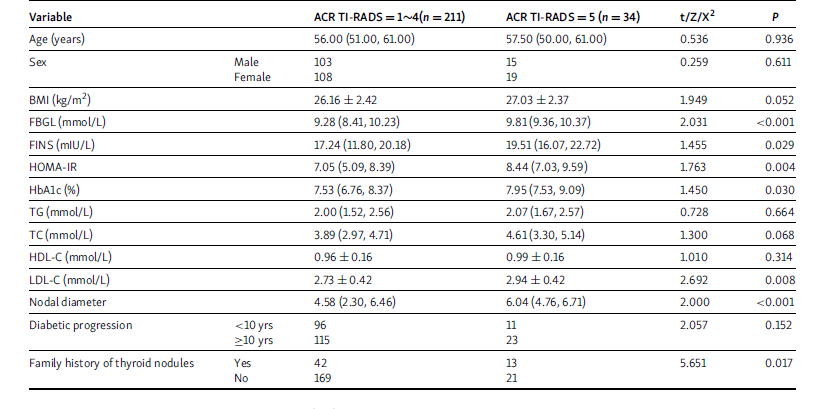Unveiling the link between ACR TI-RADS grading and Bethesda score of thyroid nodules in diabetic patients: A comprehensive analysis
DOI:
https://doi.org/10.17305/bb.2024.10670Keywords:
Type 2 diabetes mellitus, thyroid nodules, ACR TI-RADS grading, Bethesda score, logistic regression analysisAbstract
This study aimed to explores the factors influencing thyroid nodules (TNs) in individuals with type 2 diabetes mellitus (T2DM) and evaluates the consistency between different American College of Radiology Thyroid Imaging Reporting and Data System (ACR TI-RADS) grades and Bethesda scores. Total of 642 T2DM patients were divided into TN group (245) and control group (397) based on the presence or absence of TNs. TN patients were further categorized into ACR TI-RADS classification (TR) 1 to 4 and TR5 subgroups. Diabetes-related clinical and biochemical parameters were collected, and differences were analyzed using univariate analysis. Logistic regression analysis was utilized to pinpoint independent influencing factors for TN occurrence and different TN classifications. Consequently, age, body mass index (BMI), fasting plasma glucose level (FBGL), low density lipoprotein cholesterol (LDL-C), diabetic progression, and family history of TNs emerged as independent risk factors for TN development in T2DM patients. Additionally, glycosylated hemoglobin (HbA1c), nodule diameter, and family history of TNs were identified as independent risk factors for TR5 TN development in T2DM patients. All TR1 to 2 nodules had a Bethesda score of 2 and all showed benign pathological findings. In 97.10% of cases (67/69), nodules classified as TR3 exhibited a Bethesda score of 2, with all pathological results indicating benign findings, aligning with the Bethesda score. In addition, the concordance between TR4 nodules and Bethesda score was only 78.57% (88/112). In conclusion, TNs and their malignancy in T2DM patients are significantly linked to blood glucose and lipid metabolism indexes. TR3 classification in T2DM patients poses a low malignancy risk, suggesting caution when conducting fine needle aspiration cytology (FNAC) testing.
Citations
Downloads

Downloads
Published
Data Availability Statement
Data sharing is not applicable to this article as no datasets were generated or analyzed during the current study
Issue
Section
Categories
License
Copyright (c) 2024 Ying Wang, Xi Chen, Yu Chen , Fei Xie , ZhuoYan Wang, RunYue Mao, Ligang Wang

This work is licensed under a Creative Commons Attribution 4.0 International License.









